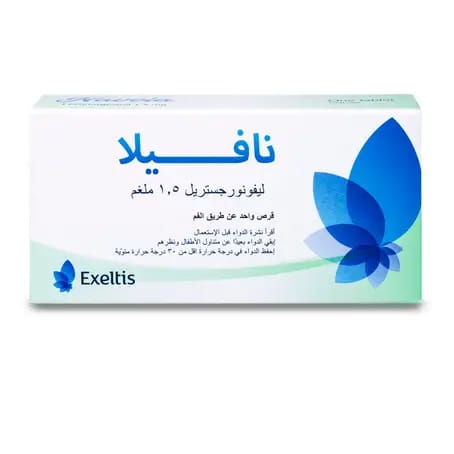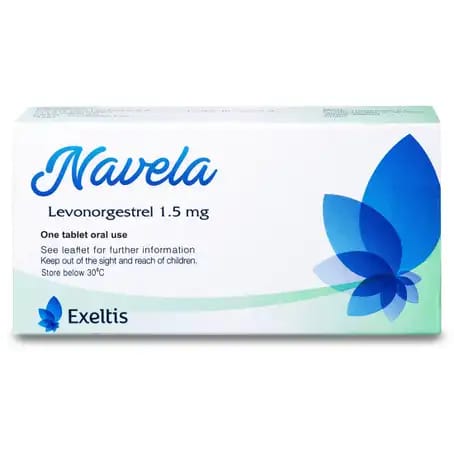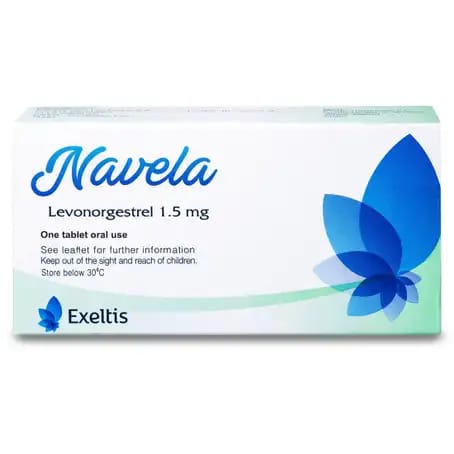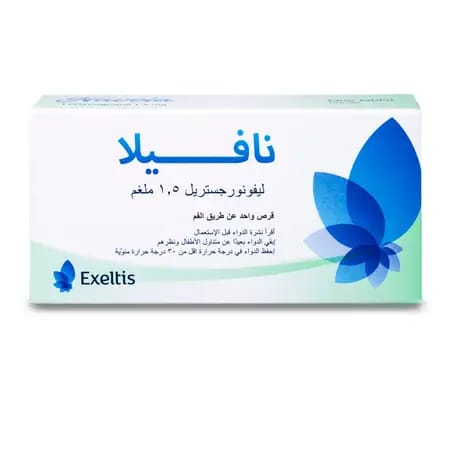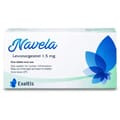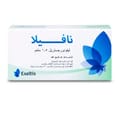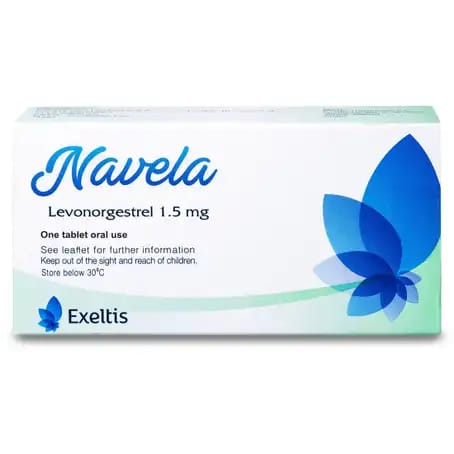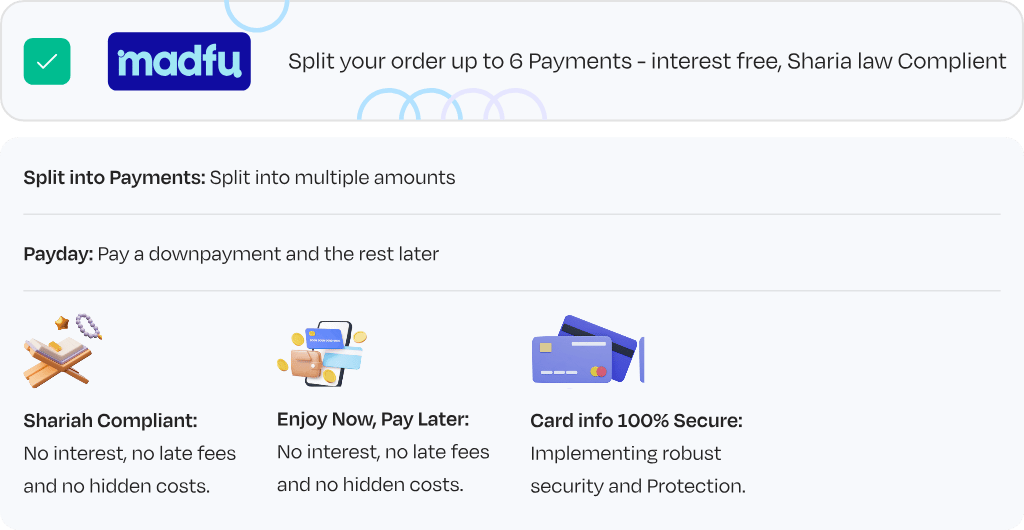What is Levonorgestrel used for:
Levonorgestrel is used as emergency contraception to prevent pregnancy after unprotected sex or incorrect use of birth control (for example missing your routine oral contraceptive doses or slipping/breaking of the condom upon use) or having sex without using any birth control method. This medication is not to be used on a routine basis and is usually given as a backup method.
Do not take Levonorgestrel:
• If you are allergic to Levonorgestrel or any of the ingredients in this medicine. Tell your doctor about the allergy and what signs you had.
• If you are pregnant. This medication will not stop pregnancy if you are already pregnant.
• For regular birth control.
Warnings and Precautions:
• Talk to your doctor or pharmacist if you develop allergic reactions such as shortness of breath, skin rash, swelling of the face or neck, decreased blood pressure and dizziness.
• Contact your doctor if you experience lower abdominal pain after taking levonorgestrel tablet in order to be evaluated for ectopic pregnancy (pregnancy that occurs outside the uterus).
• Do not take this medication if you are already pregnant; it will not stop the pregnancy.
• This medication may affect the timing of your next menses (period), contact your doctor if your menses is delayed by more than 1 week to check for pregnancy.
• This medication does not protect you and your partner against sexually transmitted diseases or HIV (a virus that can make your immunity weak and prone to infections).
Possible side effects of Levonorgestrel:
Possible side effects of Levonorgestrel include: irregular or heavier menstrual periods, lower abdominal pain, nausea, headache, dizziness, and fatigue.
Other medicines and Levonorgestrel:
Tell your doctor or pharmacist if you are taking, have recently taken or might take any other medications:
• If you are taking barbiturates (used for anxiety and convulsions).
• If you are taking bosentan (used for high blood pressure in the arteries of the lungs).
• If you are taking carbamazepine (used for anxiety and convulsions).
• If you are taking felbamate (used for convulsions).
• If you are taking griseofulvin (used to treat some types of fungal infections).
• If you are taking oxcarbazepine (used for convulsions).
• If you are taking phenytoin (used for convulsions).
• If you are taking rifampin (used for tuberculosis and other infections).
• If you are taking St. John’s wort (used for depression).
• If you are taking topiramate (mainly used for convulsions).
• If you are taking HIV medications.
- Home
- Medications
- OTC
- Navela 1.5 mg 1 Tablet
Navela 1.5 mg 1 Tablet
 38.55
38.55Loyalty Program
Loyalty
For each qualifying purchase you make, you will accumulate loyalty points. These points can then be redeemed for a variety of rewards such as discounts, exclusive, offers or even free products.
For Each
100
SAR
-->
100
POINTS
TIER2
100
SPAR SPEND
=
100
POINTS
TIER3
100
SPAR SPEND
=
100
POINTS
- Details
What is Levonorgestrel used for:
Levonorgestrel is used as emergency contraception to prevent pregnancy after unprotected sex or incorrect use of birth control (for example missing your routine oral contraceptive doses or slipping/breaking of the condom upon use) or having sex without using any birth control method. This medication is not to be used on a routine basis and is usually given as a backup method.
Do not take Levonorgestrel:• If you are allergic to Levonorgestrel or any of the ingredients in this medicine. Tell your doctor about the allergy and what signs you had.
• If you are pregnant. This medication will not stop pregnancy if you are already pregnant.
• For regular birth control.
Warnings and Precautions:• Talk to your doctor or pharmacist if you develop allergic reactions such as shortness of breath, skin rash, swelling of the face or neck, decreased blood pressure and dizziness.
• Contact your doctor if you experience lower abdominal pain after taking levonorgestrel tablet in order to be evaluated for ectopic pregnancy (pregnancy that occurs outside the uterus).
• Do not take this medication if you are already pregnant; it will not stop the pregnancy.
• This medication may affect the timing of your next menses (period), contact your doctor if your menses is delayed by more than 1 week to check for pregnancy.
• This medication does not protect you and your partner against sexually transmitted diseases or HIV (a virus that can make your immunity weak and prone to infections).
Possible side effects of Levonorgestrel:
Possible side effects of Levonorgestrel include: irregular or heavier menstrual periods, lower abdominal pain, nausea, headache, dizziness, and fatigue.
Other medicines and Levonorgestrel:
Tell your doctor or pharmacist if you are taking, have recently taken or might take any other medications:
• If you are taking barbiturates (used for anxiety and convulsions).
• If you are taking bosentan (used for high blood pressure in the arteries of the lungs).
• If you are taking carbamazepine (used for anxiety and convulsions).
• If you are taking felbamate (used for convulsions).
• If you are taking griseofulvin (used to treat some types of fungal infections).
• If you are taking oxcarbazepine (used for convulsions).
• If you are taking phenytoin (used for convulsions).
• If you are taking rifampin (used for tuberculosis and other infections).
• If you are taking St. John’s wort (used for depression).
• If you are taking topiramate (mainly used for convulsions).
• If you are taking HIV medications.
What is Levonorgestrel used for:
Levonorgestrel is used as emergency contraception to prevent pregnancy after unprotected sex or incorrect use of birth control (for example missing your routine oral contraceptive doses or slipping/breaking of the condom upon use) or having sex without using any birth control method. This medication is not to be used on a routine basis and is usually given as a backup method.
Do not take Levonorgestrel:
• If you are allergic to Levonorgestrel or any of the ingredients in this medicine. Tell your doctor about the allergy and what signs you had.
• If you are pregnant. This medication will not stop pregnancy if you are already pregnant.
• For regular birth control.
Warnings and Precautions:
• Talk to your doctor or pharmacist if you develop allergic reactions such as shortness of breath, skin rash, swelling of the face or neck, decreased blood pressure and dizziness.
• Contact your doctor if you experience lower abdominal pain after taking levonorgestrel tablet in order to be evaluated for ectopic pregnancy (pregnancy that occurs outside the uterus).
• Do not take this medication if you are already pregnant; it will not stop the pregnancy.
• This medication may affect the timing of your next menses (period), contact your doctor if your menses is delayed by more than 1 week to check for pregnancy.
• This medication does not protect you and your partner against sexually transmitted diseases or HIV (a virus that can make your immunity weak and prone to infections).
Possible side effects of Levonorgestrel:
Possible side effects of Levonorgestrel include: irregular or heavier menstrual periods, lower abdominal pain, nausea, headache, dizziness, and fatigue.
Other medicines and Levonorgestrel:
Tell your doctor or pharmacist if you are taking, have recently taken or might take any other medications:
• If you are taking barbiturates (used for anxiety and convulsions).
• If you are taking bosentan (used for high blood pressure in the arteries of the lungs).
• If you are taking carbamazepine (used for anxiety and convulsions).
• If you are taking felbamate (used for convulsions).
• If you are taking griseofulvin (used to treat some types of fungal infections).
• If you are taking oxcarbazepine (used for convulsions).
• If you are taking phenytoin (used for convulsions).
• If you are taking rifampin (used for tuberculosis and other infections).
• If you are taking St. John’s wort (used for depression).
• If you are taking topiramate (mainly used for convulsions).
• If you are taking HIV medications.
How to take Levonorgestrel:
Women 17 years and older:
Recommended dose is: If you are using 1.5 mg tablet (box has 1 tablet only): 1 tablet orally once within 72 hours after unprotected sex. If you are using the 0.75 mg tablets (box has 2 tablets), make sure to take 1 tablet followed by the second tablet after 12 hours of taking the first, both tablets should be given within a 72-hour period after unprotected sex. If you vomit within 2 hours of taking a dose, make sure to contact your doctor to check if you have to take another replacement dose.
Post-pubertal adolescents younger than 17 years:
Dosage is the same as above. You will need to ask for a prescription from your doctor before taking the medication.
• Take tablets with or without food.
• Take tablet with a full glass of water.
• Do not chew or crush tablets.
• Take tablet as soon as possible after unprotected sex; the medication was shown to be more effective when taken sooner.
• This medication should never be given to post-menopausal women or pre-pubertal females.
What is Levonorgestrel used for:
Levonorgestrel is used as emergency contraception to prevent pregnancy after unprotected sex or incorrect use of birth control (for example missing your routine oral contraceptive doses or slipping/breaking of the condom upon use) or having sex without using any birth control method. This medication is not to be used on a routine basis and is usually given as a backup method.
Do not take Levonorgestrel:
• If you are allergic to Levonorgestrel or any of the ingredients in this medicine. Tell your doctor about the allergy and what signs you had.
• If you are pregnant. This medication will not stop pregnancy if you are already pregnant.
• For regular birth control.
Warnings and Precautions:
• Talk to your doctor or pharmacist if you develop allergic reactions such as shortness of breath, skin rash, swelling of the face or neck, decreased blood pressure and dizziness.
• Contact your doctor if you experience lower abdominal pain after taking levonorgestrel tablet in order to be evaluated for ectopic pregnancy (pregnancy that occurs outside the uterus).
• Do not take this medication if you are already pregnant; it will not stop the pregnancy.
• This medication may affect the timing of your next menses (period), contact your doctor if your menses is delayed by more than 1 week to check for pregnancy.
• This medication does not protect you and your partner against sexually transmitted diseases or HIV (a virus that can make your immunity weak and prone to infections).
Possible side effects of Levonorgestrel:
Possible side effects of Levonorgestrel include: irregular or heavier menstrual periods, lower abdominal pain, nausea, headache, dizziness, and fatigue.
Other medicines and Levonorgestrel:
Tell your doctor or pharmacist if you are taking, have recently taken or might take any other medications:
• If you are taking barbiturates (used for anxiety and convulsions).
• If you are taking bosentan (used for high blood pressure in the arteries of the lungs).
• If you are taking carbamazepine (used for anxiety and convulsions).
• If you are taking felbamate (used for convulsions).
• If you are taking griseofulvin (used to treat some types of fungal infections).
• If you are taking oxcarbazepine (used for convulsions).
• If you are taking phenytoin (used for convulsions).
• If you are taking rifampin (used for tuberculosis and other infections).
• If you are taking St. John’s wort (used for depression).
• If you are taking topiramate (mainly used for convulsions).
• If you are taking HIV medications.
How to take Levonorgestrel:
Women 17 years and older:
Recommended dose is: If you are using 1.5 mg tablet (box has 1 tablet only): 1 tablet orally once within 72 hours after unprotected sex. If you are using the 0.75 mg tablets (box has 2 tablets), make sure to take 1 tablet followed by the second tablet after 12 hours of taking the first, both tablets should be given within a 72-hour period after unprotected sex. If you vomit within 2 hours of taking a dose, make sure to contact your doctor to check if you have to take another replacement dose.
Post-pubertal adolescents younger than 17 years:
Dosage is the same as above. You will need to ask for a prescription from your doctor before taking the medication.
• Take tablets with or without food.
• Take tablet with a full glass of water.
• Do not chew or crush tablets.
• Take tablet as soon as possible after unprotected sex; the medication was shown to be more effective when taken sooner.
• This medication should never be given to post-menopausal women or pre-pubertal females.
What is Levonorgestrel used for:
Levonorgestrel is used as emergency contraception to prevent pregnancy after unprotected sex or incorrect use of birth control (for example missing your routine oral contraceptive doses or slipping/breaking of the condom upon use) or having sex without using any birth control method. This medication is not to be used on a routine basis and is usually given as a backup method.
Do not take Levonorgestrel:
• If you are allergic to Levonorgestrel or any of the ingredients in this medicine. Tell your doctor about the allergy and what signs you had.
• If you are pregnant. This medication will not stop pregnancy if you are already pregnant.
• For regular birth control.
Warnings and Precautions:
• Talk to your doctor or pharmacist if you develop allergic reactions such as shortness of breath, skin rash, swelling of the face or neck, decreased blood pressure and dizziness.
• Contact your doctor if you experience lower abdominal pain after taking levonorgestrel tablet in order to be evaluated for ectopic pregnancy (pregnancy that occurs outside the uterus).
• Do not take this medication if you are already pregnant; it will not stop the pregnancy.
• This medication may affect the timing of your next menses (period), contact your doctor if your menses is delayed by more than 1 week to check for pregnancy.
• This medication does not protect you and your partner against sexually transmitted diseases or HIV (a virus that can make your immunity weak and prone to infections).
Possible side effects of Levonorgestrel:
Possible side effects of Levonorgestrel include: irregular or heavier menstrual periods, lower abdominal pain, nausea, headache, dizziness, and fatigue.
Other medicines and Levonorgestrel:
Tell your doctor or pharmacist if you are taking, have recently taken or might take any other medications:
• If you are taking barbiturates (used for anxiety and convulsions).
• If you are taking bosentan (used for high blood pressure in the arteries of the lungs).
• If you are taking carbamazepine (used for anxiety and convulsions).
• If you are taking felbamate (used for convulsions).
• If you are taking griseofulvin (used to treat some types of fungal infections).
• If you are taking oxcarbazepine (used for convulsions).
• If you are taking phenytoin (used for convulsions).
• If you are taking rifampin (used for tuberculosis and other infections).
• If you are taking St. John’s wort (used for depression).
• If you are taking topiramate (mainly used for convulsions).
• If you are taking HIV medications.
How to take Levonorgestrel:
Women 17 years and older:
Recommended dose is: If you are using 1.5 mg tablet (box has 1 tablet only): 1 tablet orally once within 72 hours after unprotected sex. If you are using the 0.75 mg tablets (box has 2 tablets), make sure to take 1 tablet followed by the second tablet after 12 hours of taking the first, both tablets should be given within a 72-hour period after unprotected sex. If you vomit within 2 hours of taking a dose, make sure to contact your doctor to check if you have to take another replacement dose.
Post-pubertal adolescents younger than 17 years:
Dosage is the same as above. You will need to ask for a prescription from your doctor before taking the medication.
• Take tablets with or without food.
• Take tablet with a full glass of water.
• Do not chew or crush tablets.
• Take tablet as soon as possible after unprotected sex; the medication was shown to be more effective when taken sooner.
• This medication should never be given to post-menopausal women or pre-pubertal females.

